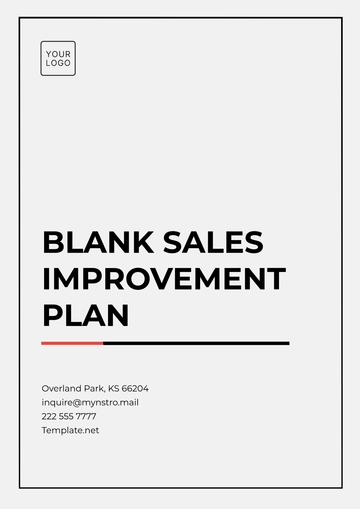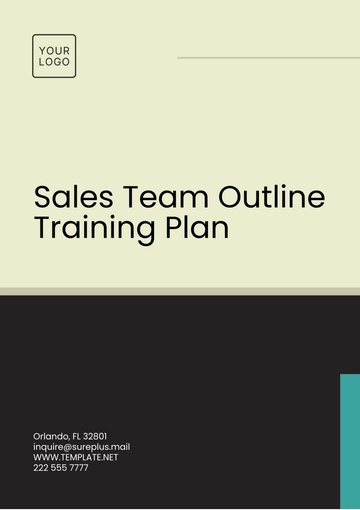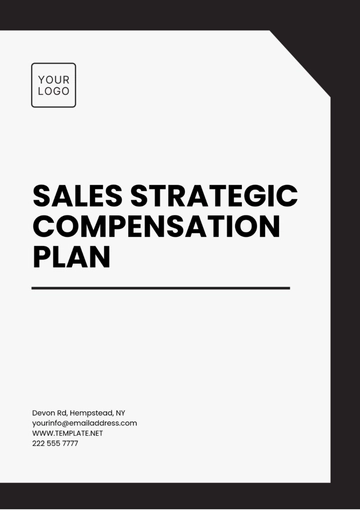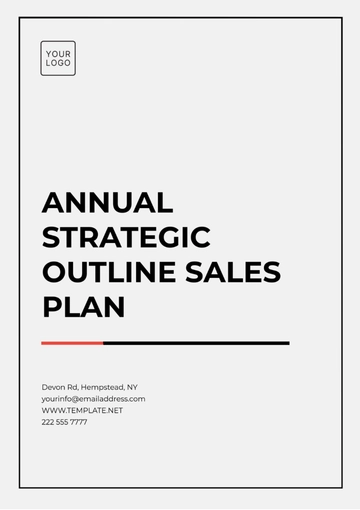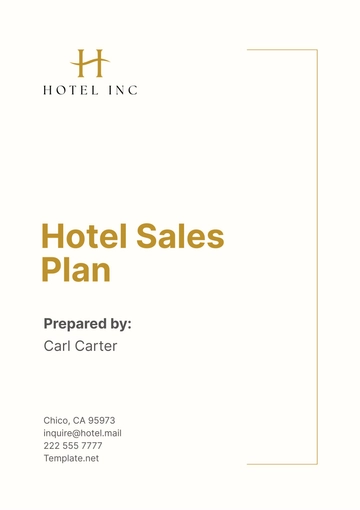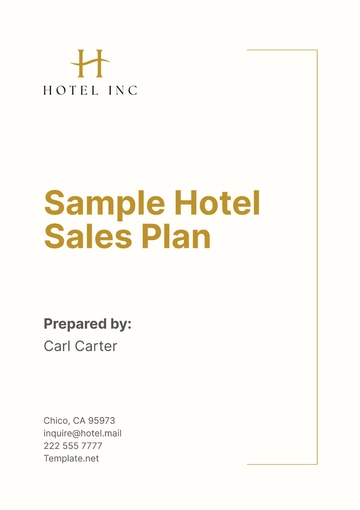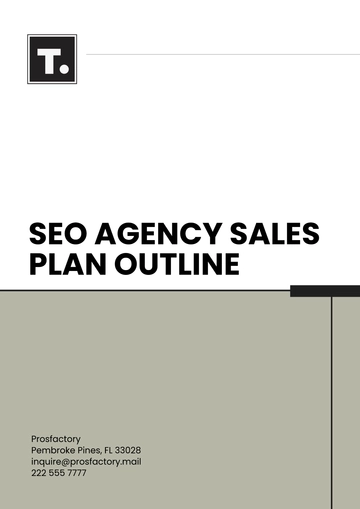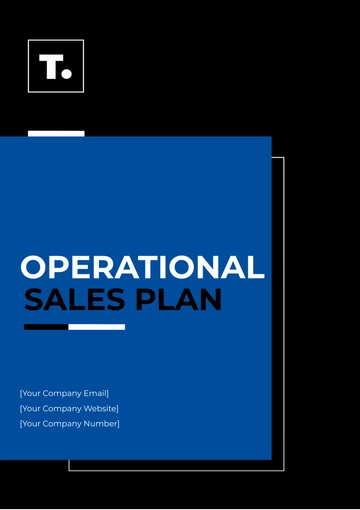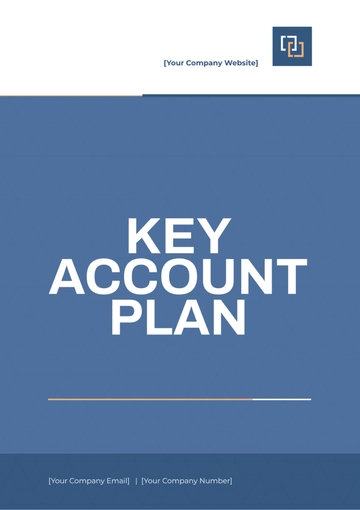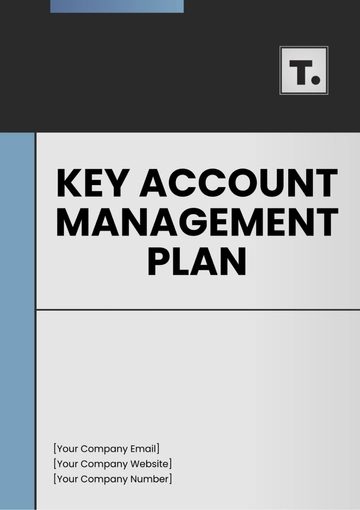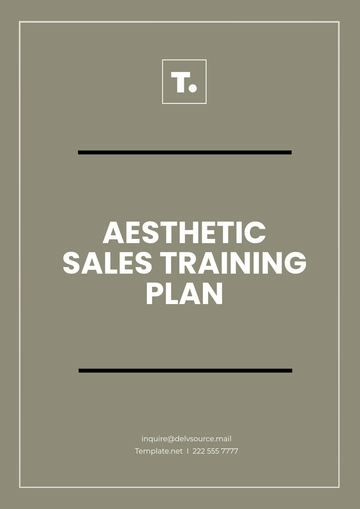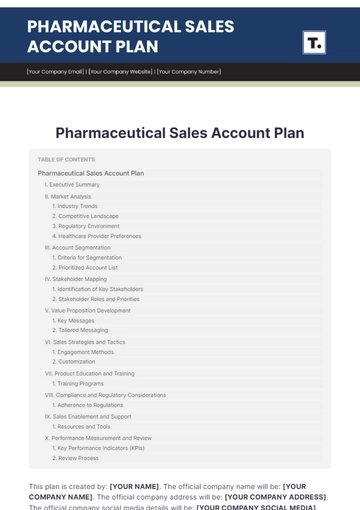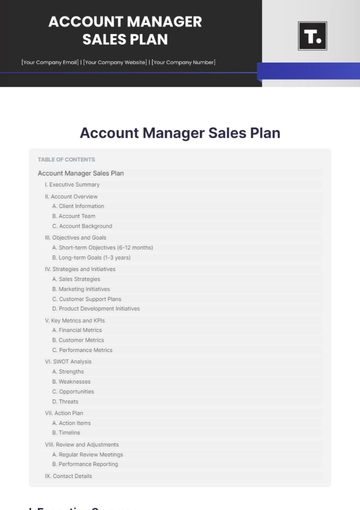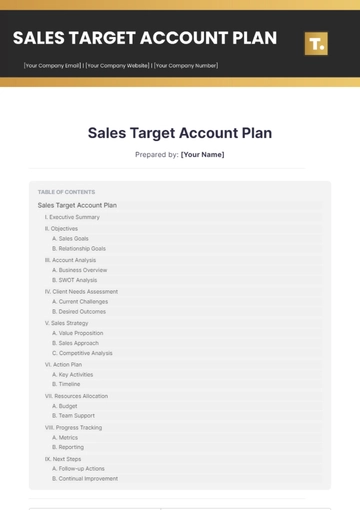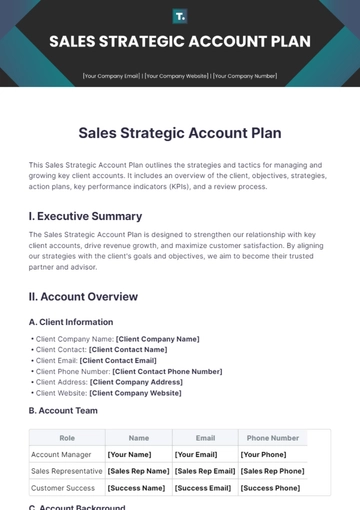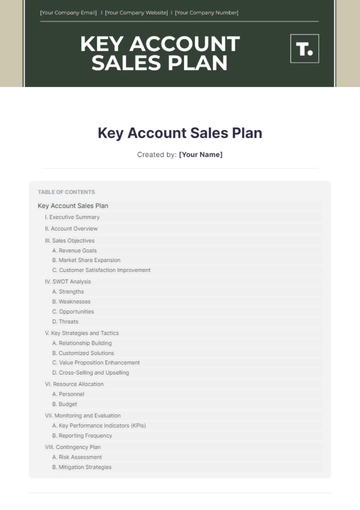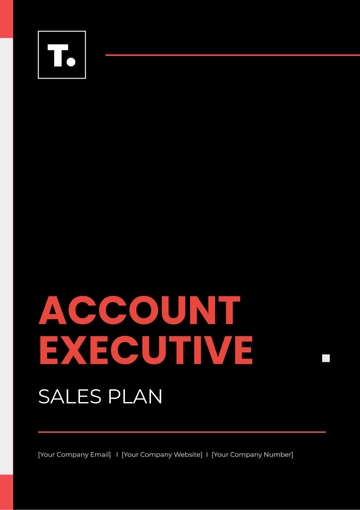Free Sales Plan for Year-round Training
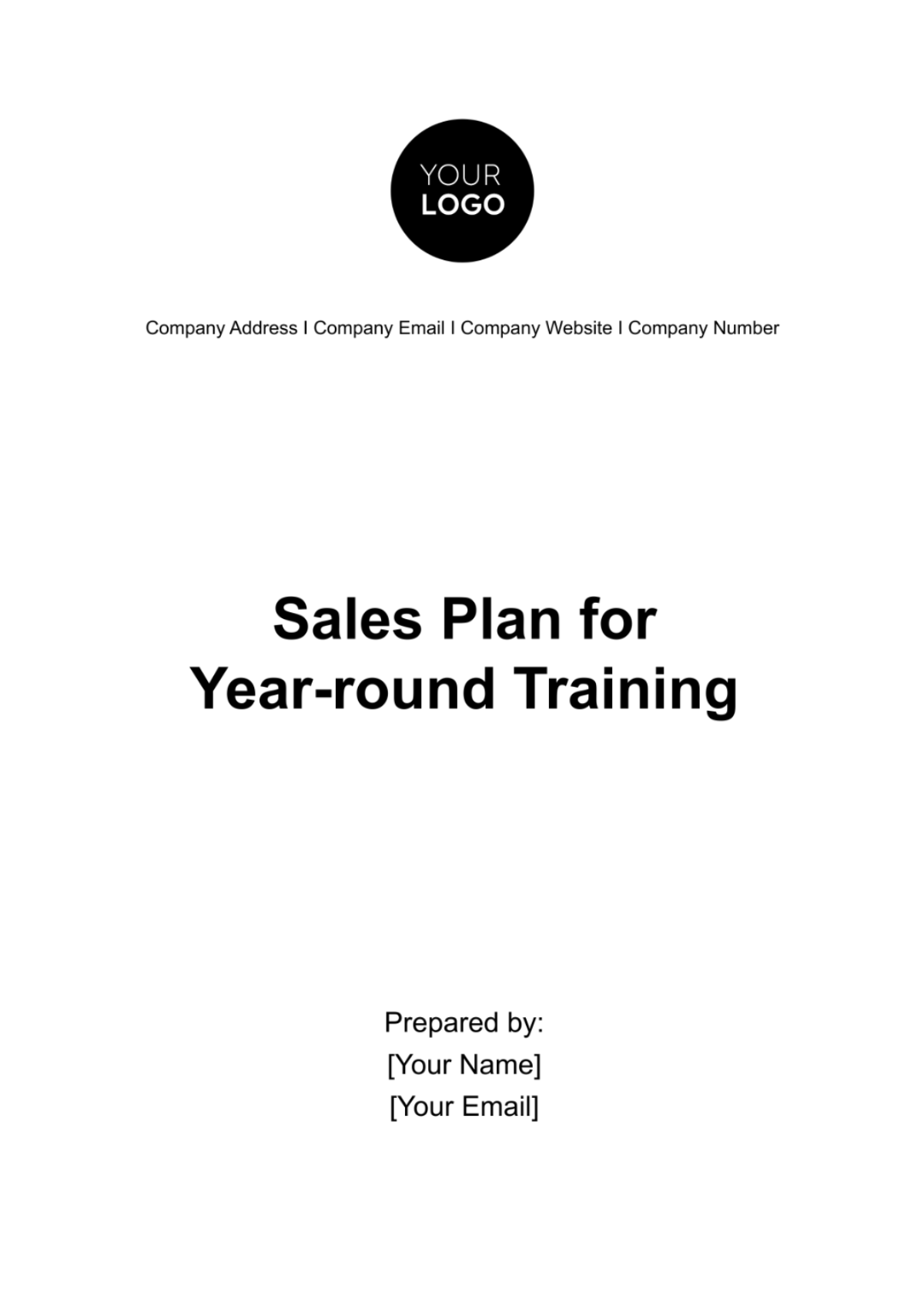
I. Executive Summary
In our pursuit of excellence and sustained growth, we recognize the critical role that a well-structured, year-round sales training program plays in enhancing our sales team's capabilities and performance. Our Sales Plan for Year-round Training is designed to address the evolving needs of our market and our sales force, ensuring they are equipped with the latest skills and knowledge to exceed our sales targets. This document outlines a comprehensive approach to identifying training needs, setting clear objectives, and implementing a robust training schedule that aligns with our strategic goals. Through this plan, we aim to not only improve the effectiveness of our sales team but also foster a culture of continuous learning and development.
II. Training Needs Assessment
A thorough assessment of our current sales competencies versus required skills has revealed critical gaps that, if addressed, could significantly enhance our team's performance. Our analysis focused on various competencies including product knowledge, sales techniques, customer service, and technological proficiency.
Product Knowledge: 75% of the team scored below the desired proficiency level, indicating a need for in-depth product training.
Sales Techniques: 60% of our sales force lacks advanced negotiation skills, impacting deal closures.
Customer Service: 50% of the team has not met the expected standards in customer engagement and satisfaction metrics.
Technological Proficiency: With only 40% of the team comfortable using our latest sales CRM, there is a clear need for comprehensive technology training.
III. Training Objectives
To address the identified needs and ultimately enhance our sales performance, we have set forth the following training objectives:
Increase product knowledge across the team by 30% within the next six months, ensuring all sales representatives can effectively communicate the value and features of our products.
Develop advanced negotiation and sales techniques, aiming to improve our deal closure rate by 25% by the end of the year.
Enhance customer service skills, with the goal of raising customer satisfaction scores by 20% in the next quarter.
Achieve a 100% proficiency level in the use of our sales CRM among the sales team, facilitating more efficient sales processes and data management within the next three months.
IV. Annual Training Calendar
To ensure a systematic and continuous development of our sales team's competencies throughout the year, we have devised a detailed Annual Training Calendar. This calendar is designed to spread the training sessions evenly, allowing for the reinforcement of learned skills and minimizing the impact on sales activities. It covers a variety of training activities, including workshops, e-learning modules, and on-the-job training, each strategically scheduled to address our training objectives.
Month | Activity | Duration |
January | Product Knowledge Workshop | 2 days |
February | Advanced Sales Techniques Webinar | 3 days |
March | Customer Service Excellence Seminar | 2 days |
April | CRM Technology Training | 1 week |
May | Mid-Year Review & Feedback Session | 1 day |
June | Negotiation Skills Workshop | 2 days |
July | Product Updates and Features Training | 2 days |
August | Role-Playing and Sales Scenarios | 3 days |
September | Customer Relationship Management | 2 days |
October | Sales Strategy and Planning Retreat | 3 days |
November | Technology Refresher Course | 2 days |
December | Year-End Review & Planning for Next Year | 2 days |
V. Curriculum and Content
The Curriculum and Content of our training program are meticulously designed to bridge the identified competency gaps and achieve our training objectives. Each module focuses on specific areas of development, combining theoretical knowledge with practical exercises to ensure comprehensive learning and application in real-world scenarios.
Curriculum | Content | Duration |
Product Knowledge | In-depth training on product features, benefits, and competitive analysis | 20 hours |
Sales Techniques | Advanced negotiation, persuasive selling, and closing techniques | 15 hours |
Customer Service Excellence | Building rapport, handling objections, and enhancing customer satisfaction | 10 hours |
Technological Proficiency | Hands-on CRM training, data management, and reporting | 25 hours |
Negotiation Skills | Techniques for effective negotiation, conflict resolution | 10 hours |
Sales Strategy and Planning | Market analysis, sales forecasting, and strategic planning | 15 hours |
VI. Training Methodologies
To cater to the diverse learning preferences of our sales team and maximize the effectiveness of our training program, we have selected a variety of training methodologies. Each method is chosen for its ability to engage participants actively and facilitate the practical application of skills. Our aim is to create a dynamic and interactive learning environment that encourages participation and fosters a deeper understanding of the training material.
Instructor-led Training
E-learning Modules
Webinars
On-the-Job Training
Role-Playing
Peer Learning
VII. Trainers and Facilitators
Our trainers and facilitators are carefully selected based on their expertise, teaching abilities, and experience in sales training. They play a crucial role in delivering our curriculum effectively and inspiring our sales team to achieve their full potential. Below are profiles of three of our esteemed trainers:
Name | Expertise | Experience | Teaching Method |
Product Knowledge | 10 years | Interactive workshops, engaging multimedia | |
Sales Techniques | 12 years | Dynamic webinars, hands-on role-playing sessions | |
Technological Proficiency | 8 years | E-learning development, practical CRM training |
VIII. Participant Management
To ensure a smooth and efficient process for enrolling our sales team members in the training sessions, we have established the following procedure:
Training Needs Analysis: Assess individual training needs based on performance reviews and competency assessments.
Training Schedule Notification: Communicate the annual training calendar, including session dates and topics, well in advance.
Registration Process: Implement an easy-to-use registration system via our internal portal for team members to enroll in sessions.
Confirmation and Reminders: Send out confirmation emails upon registration and reminder notifications as the training dates approach.
Attendance Tracking: Utilize digital tools to track attendance and participation during the training sessions.
Feedback Collection: Gather feedback post-training to assess the effectiveness of the sessions and identify areas for improvement.
IX. Performance Evaluation and Metrics
To accurately measure the impact of our Sales Plan for Year-round Training, we have established a set of performance evaluation metrics. These metrics are designed to assess both the immediate and long-term effectiveness of the training program, ensuring it meets our objectives and contributes to our overall sales strategy. Regular assessments will allow us to adjust the training content and methodologies as needed.
Metric | Target Value |
Increase in Sales Volume | 20% increase year-over-year |
Customer Satisfaction Score | 15% improvement post-training |
CRM Utilization Rate | 100% proficiency within 3 months |
Training Participation Rate | 95% of sales team engaged annually |
Sales Cycle Time Reduction | 10% reduction within 6 months |
X. Budget and Financing
A comprehensive budget has been prepared to cover all aspects of the Sales Plan for Year-round Training. This includes costs associated with trainers, materials, technology, and other resources necessary to deliver a high-quality training program.
Item | Cost |
Trainer Fees | $30,000 |
Training Materials | $5,000 |
Technology (Software & Platforms) | $10,000 |
Venue & Logistics | $8,000 |
Miscellaneous Expenses | $2,000 |
Total | $55,000 |
XI. Implementation Plan
A detailed implementation plan has been developed to ensure the smooth execution of the training program. This plan outlines the steps, timelines, and responsibilities for each phase of the program.
Step | Timeline | Responsibility |
Finalize Training Curriculum | Month 1 | Training Department |
Schedule Training Sessions | Month 2 | HR Department |
Enroll Participants | Month 3 | Sales Managers |
Conduct Training Sessions | Months 4-11 | Trainers |
Evaluate Program Effectiveness | Month 12 | Training Department |
XII. Risk Management
To anticipate and mitigate potential risks to the training program, we have conducted a thorough risk analysis. This includes identifying potential challenges, assessing their likelihood and impact, and outlining mitigation strategies.
Risk | Likelihood | Impact | Mitigation |
Low Participation Rates | Medium | High | Offer incentives, highlight benefits |
Insufficient Budget | Low | High | Seek additional funding, adjust scope |
Technological Issues | Medium | Medium | Ensure IT support, have backups ready |
Changes in Business Objectives | Low | High | Regularly review and adjust training |
XIII. Conclusion
In conclusion, our Sales Plan for Year-round Training represents a comprehensive and strategic approach to enhancing the capabilities of our sales team. Through a carefully designed curriculum, diverse training methodologies, and a focus on measurable outcomes, we are committed to achieving our sales objectives and driving the success of our organization. This plan is not only an investment in our sales team but also in the long-term growth and competitiveness of our business. We look forward to the positive impact this program will have on our team's performance and overall business results.
- 100% Customizable, free editor
- Access 1 Million+ Templates, photo’s & graphics
- Download or share as a template
- Click and replace photos, graphics, text, backgrounds
- Resize, crop, AI write & more
- Access advanced editor
Unveil the Sales Plan for Year-round Training Template at Template.net. This meticulously designed template facilitates the creation of an annual training agenda, fully editable and customizable to align with your strategic goals. Modify it effortlessly for your organization's requirements, all within our AI Editor tool. Ensure continuous development and success with this adaptable, comprehensive training plan template.
You may also like
- Finance Plan
- Construction Plan
- Sales Plan
- Development Plan
- Career Plan
- Budget Plan
- HR Plan
- Education Plan
- Transition Plan
- Work Plan
- Training Plan
- Communication Plan
- Operation Plan
- Health And Safety Plan
- Strategy Plan
- Professional Development Plan
- Advertising Plan
- Risk Management Plan
- Restaurant Plan
- School Plan
- Nursing Home Patient Care Plan
- Nursing Care Plan
- Plan Event
- Startup Plan
- Social Media Plan
- Staffing Plan
- Annual Plan
- Content Plan
- Payment Plan
- Implementation Plan
- Hotel Plan
- Workout Plan
- Accounting Plan
- Campaign Plan
- Essay Plan
- 30 60 90 Day Plan
- Research Plan
- Recruitment Plan
- 90 Day Plan
- Quarterly Plan
- Emergency Plan
- 5 Year Plan
- Gym Plan
- Personal Plan
- IT and Software Plan
- Treatment Plan
- Real Estate Plan
- Law Firm Plan
- Healthcare Plan
- Improvement Plan
- Media Plan
- 5 Year Business Plan
- Learning Plan
- Marketing Campaign Plan
- Travel Agency Plan
- Cleaning Services Plan
- Interior Design Plan
- Performance Plan
- PR Plan
- Birth Plan
- Life Plan
- SEO Plan
- Disaster Recovery Plan
- Continuity Plan
- Launch Plan
- Legal Plan
- Behavior Plan
- Performance Improvement Plan
- Salon Plan
- Security Plan
- Security Management Plan
- Employee Development Plan
- Quality Plan
- Service Improvement Plan
- Growth Plan
- Incident Response Plan
- Basketball Plan
- Emergency Action Plan
- Product Launch Plan
- Spa Plan
- Employee Training Plan
- Data Analysis Plan
- Employee Action Plan
- Territory Plan
- Audit Plan
- Classroom Plan
- Activity Plan
- Parenting Plan
- Care Plan
- Project Execution Plan
- Exercise Plan
- Internship Plan
- Software Development Plan
- Continuous Improvement Plan
- Leave Plan
- 90 Day Sales Plan
- Advertising Agency Plan
- Employee Transition Plan
- Smart Action Plan
- Workplace Safety Plan
- Behavior Change Plan
- Contingency Plan
- Continuity of Operations Plan
- Health Plan
- Quality Control Plan
- Self Plan
- Sports Development Plan
- Change Management Plan
- Ecommerce Plan
- Personal Financial Plan
- Process Improvement Plan
- 30-60-90 Day Sales Plan
- Crisis Management Plan
- Engagement Plan
- Execution Plan
- Pandemic Plan
- Quality Assurance Plan
- Service Continuity Plan
- Agile Project Plan
- Fundraising Plan
- Job Transition Plan
- Asset Maintenance Plan
- Maintenance Plan
- Software Test Plan
- Staff Training and Development Plan
- 3 Year Plan
- Brand Activation Plan
- Release Plan
- Resource Plan
- Risk Mitigation Plan
- Teacher Plan
- 30 60 90 Day Plan for New Manager
- Food Safety Plan
- Food Truck Plan
- Hiring Plan
- Quality Management Plan
- Wellness Plan
- Behavior Intervention Plan
- Bonus Plan
- Investment Plan
- Maternity Leave Plan
- Pandemic Response Plan
- Succession Planning
- Coaching Plan
- Configuration Management Plan
- Remote Work Plan
- Self Care Plan
- Teaching Plan
- 100-Day Plan
- HACCP Plan
- Student Plan
- Sustainability Plan
- 30 60 90 Day Plan for Interview
- Access Plan
- Site Specific Safety Plan


